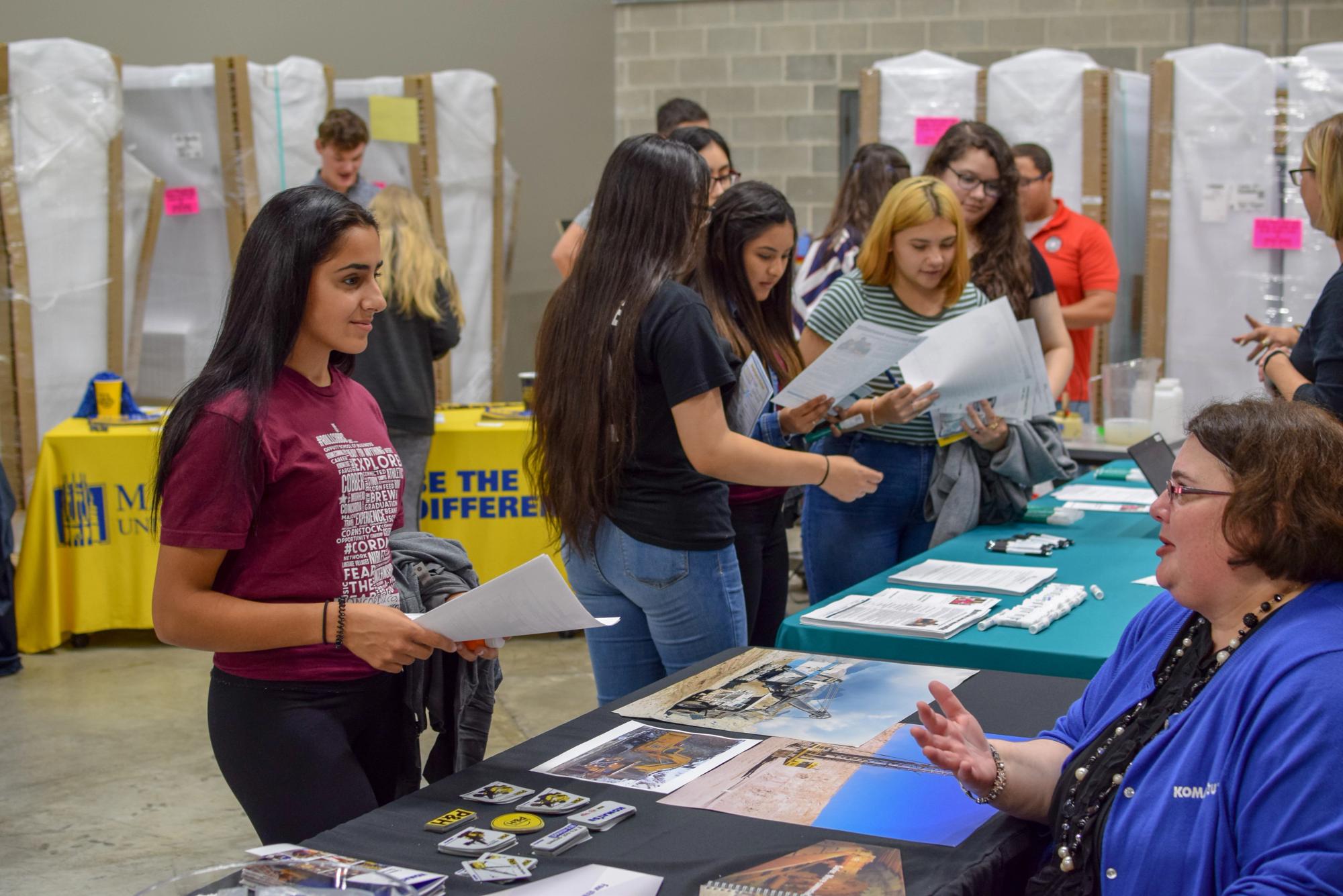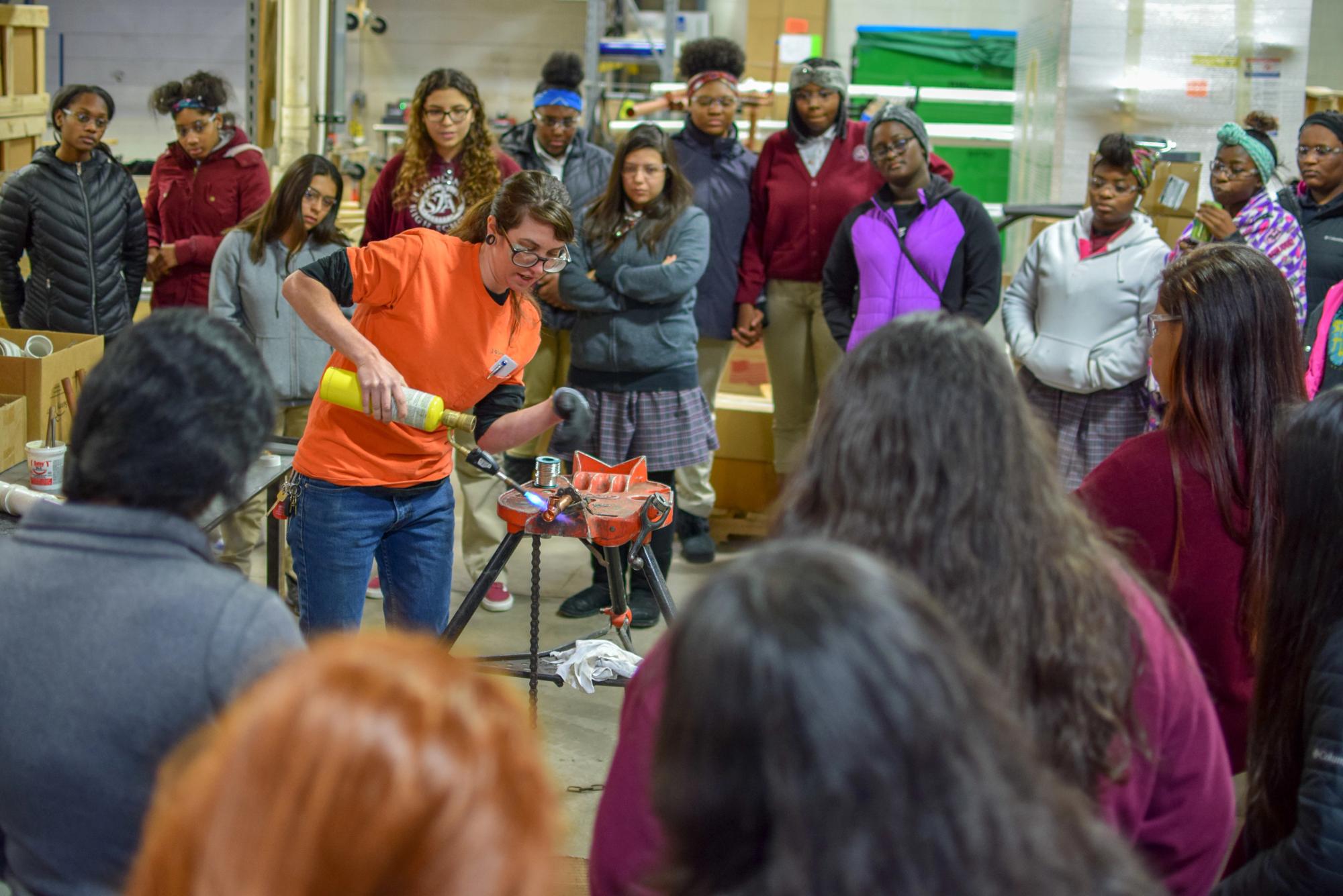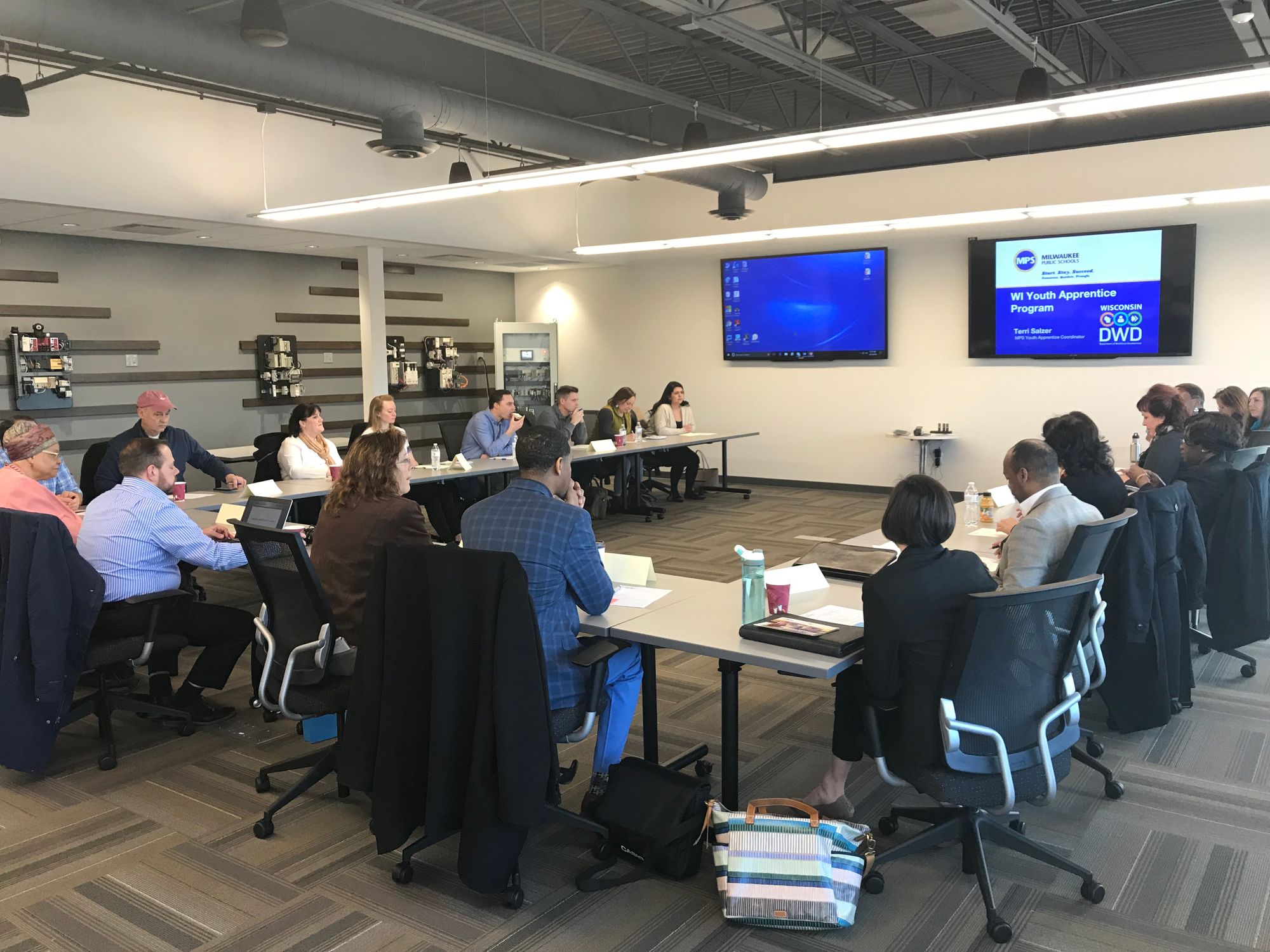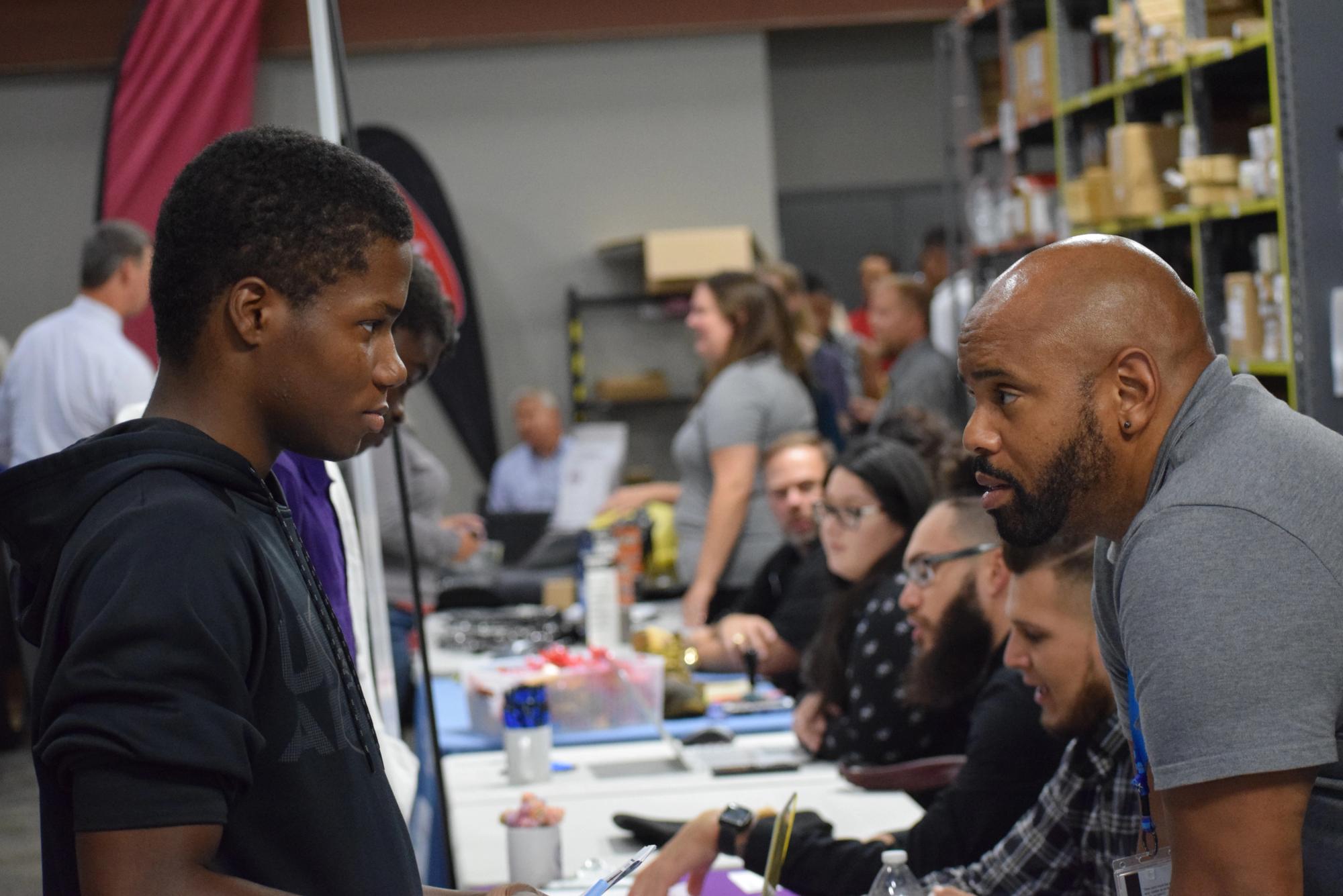Revitalizing Milwaukee’s Workforce in the Menomonee River Valley
Envisioning a thriving Valley with a well-balanced mix of industrial, recreational, and entertainment uses that strengthen Milwaukee

Brief Introduction, History, & Background
Menomonee Valley Partners (MVP) is a business improvement district (BID) whose mission is to revitalize and sustain the Menomonee River Valley - 1200 acres in the center of Milwaukee. In the early 1900s Milwaukee was known as the “Machine Shop of the World” and the Menomonee River Valley was its engine. But by the late 1900s manufacturing businesses had left the Valley, leaving abandoned buildings and brownfields, creating an eyesore, and leaving residents who live closest to the Valley with fewer job opportunities. Since its founding in 1999 as a 501(c)(3) nonprofit, MVP has served as a lead convener and coordinator of public and private stakeholders who are contributing to the redevelopment of Milwaukee’s Menomonee River Valley. The initial focus was on building infrastructure - including new roads, bridges, and 1,000,000+ square feet of green buildings - to attract manufacturing companies back to the valley, as well as cleaning up 300 acres brownfield, and developing 60+ acres of new trails and park space to improve wildlife habitat and water quality and to attract Milwaukee residents. Over their 20+ year history MVP has taken on many different roles and responsibilities: MVP works to remove barriers to private sector redevelopment; they lead the creation of new amenities like public park space, bike, and pedestrian trails for employees and neighbors; they advocate and raise funds for new infrastructure projects, environmental restoration, and quality of life improvements; and they recruit new businesses while also helping existing businesses expand. As a result of MVP’s work and leadership, more than 50 companies have either started in or relocated to the Menomonee River Valley creating 5,200+ family-supporting jobs.
As the number of businesses in the Valley increased, MVP became an important member of the Milwaukee workforce development community. As a convener and organizer MVP is uniquely positioned to hear about the manufacturing business community’s need for talent and about the surrounding communities’ need for access to education and career opportunities. MVP learned that as new companies were locating in the Valley, they were recruiting workers from the suburbs and other neighborhoods in Milwaukee, skipping over the residents living closest to the Valley. Over their history, MVP has developed multiple programs that address equity and diversity in manufacturing and build new pathways between the businesses in the district and residents in surrounding neighborhoods.
About Career Discovery Initiative, Neighborhood Connectivity, and JobUp
MVP works with over 100 companies, all of whom have voiced that they struggle to fill positions, have high turnover, and will be losing employees to an upcoming wave of retirement. Menomonee Valley Partners is leading the development of many programs to help alleviate these issues. For example, the Career Discovery Initiative, the Neighborhood Connectivity program, and the JobUp training partnership all work to introduce young people of color to career paths in manufacturing, help individuals living near the Valley find job opportunities, and address the barriers that keep incumbent workers in the lower end jobs and help them move up into skilled positions.
The longest running program is the Neighborhood Connectivity Program. The neighborhoods surrounding the Valley are some of the lowest income neighborhoods in the City. As redevelopment in the Valley progressed, MVP surveyed those working there and found they were largely not from adjacent areas. When interviewed, business owners identified they didn’t know how to hire from the neighborhoods and when neighborhood residents were asked about why they don’t seek jobs there, they voiced they didn't understand how to connect to the Valley. Some of this was due to a physical barrier: the Valley is a river valley and there are only a few ways to enter from its steep hillsides. Residents were literally driving over the valley and nothing was bringing them down into it. Thanks to MVP there are now new ways of “bringing the floor of the valley” to those neighborhoods. MVP started by creating relationships with neighborhood organizations active in the surrounding areas. Whenever an organization would have events - for example, a career fair at a school, a summer festival, or a church-led community gathering - staff of MVP staff would go advocate on behalf of their businesses. In the beginning MVP acted as a liaison for businesses, providing job applications and information from different companies to residents and community organizations. This was the start of the bridge building process. Over time neighborhood organizations started to learn they are an integral part of ensuring that their residents knew where job opportunities existed. Because workforce development is a big issue, and has been that way for decades, it's complicated for organizations to get involved because they don’t necessarily know what to focus on or what role to play. MVP provided them a way to help out. Now neighborhood organizations can work with MVP who, in essence, brings employers into their neighborhoods to share opportunities directly with their residents.

MVP’s Career Discovery Initiative connects neighborhood youth to career paths, mentors, and hands-on learning. The program started about seven years ago when the superintendent of a local school district spoke up at an event with manufacturing business owners in attendance about the huge divide between businesses and youth. MVP responded to this call to connect and organized many business owners to develop tours of facilities in the Valley. The first school invited was the high school closest to the Menomonee River Valley and now the Milwaukee Public School system, charter schools, and private schools participate. MVP built the initiative for kids and teachers who wanted to understand how what they're teaching and learning relates to a career. Teachers complete a survey about what they teach and MVP staff work with companies to find ways during the visit to connect what they do to what is being taught. The tours have also impacted the companies as well. A Black female student was passionate about being an engineer but when she was on a tour she didn’t see any women working as engineers and she took this to mean she couldn’t be an engineer. MVP shared this experience with the factory owner and they took the initiative to connect the student with their lead engineer, who is a woman and was out that day. This inspired MVP to create a women’s mentorship program connecting women working in manufacturing in the Valley to young women interested in engineering, manufacturing, real estate and skilled trades. The tours continue to be successful with close to 40 companies participating since it began. And tours continue to spark new possibilities, such as training for teachers who want to find more ways of connecting classroom learning to skills needed in manufacturing.

JobUp is MVPs newest initiative, the idea for which came about through a collaborative effort to apply to JPMorgan Chase’s Advancing Cities challenge. MVP, Havenwoods Neighborhood Partnership (another business improvement district), YWCA Southeast Wisconsin, and Milwaukee Area Technical College (MATC) worked together to respond to two city-wide issues: high unemployment and low numbers of people of color in higher level positions. Their response to the challenge was informed by a third factor: a high dropout rate in technical training certifications. The theory the partners came up with was: if they could develop a way to increase the success rate of students completing technical education, they could help increase access to entry level jobs and increase the opportunities for workers to climb the career ladder, while also promoting lifelong learning. The solution they proposed is to provide wraparound services like transportation, childcare, and healthcare, because when those needs aren’t met one's ability to commit to and succeed in education is drastically impacted. The proposal wasn’t chosen as an Advancing Cities winner; however, the partners believed this strategy was worth pursuing and found local funders who provided capital to pilot the initiative. While the JobUp program is still very new, a coordinator has been hired and is working between all the partners. Further, MATC is offering free tuition for qualifying students either coming directly out of high school or have six or fewer credits (the primary funding source for the program is a federal Pell Grant for low-income students). MATC and MVP are working together to understand what the hard to fill positions are for companies, while also understanding what students want to learn. And, MVP is working with employers to hire workers and train apprenticeships and collaborating with community partners to develop the network of wraparound services for students.
Catrina quote:
“15 years ago, and even 10 years ago, if I had different companies in a room together, I got so much resistance when talking about collaborative solutions because they saw each other as competitors. Now, they all see their purpose and that if we don't work together, we won't solve some of those deep workforce challenges that many of them have. So now we're working together, people are sharing solutions.”

Keys to Success
Catrina Crane, Director of Workforce Development & Business Solutions at MVP, points out one key to success is having businesses who are willing to pilot programs such as these. In just the past few years, MVP has seen companies become more willing to look within their own walls to say: “We see that there's a need for change, but how do we make that change?” Employers are not as rigid as they were a decade ago and they want to be a part of the solution. MVP and partners have found ways to model collaboration and an openness to trying new things, to see what works and what doesn’t, knowing that you need employers to make something like this work.
Companies are also opening up about their own internal issues, especially ingrained bias and racist policies. Historically these conversations have been hard for companies to have and individuals have been afraid to talk about their own bias. Having a few companies willing to do the work has led MVP to explore how to support the conversations and learning across more companies. In fact, it's also led to MVP and YWCA partnering to develop courageous places and ways for employers and workers to talk about these issues and developing training for companies. MVP is in the process of creating a peer networking group where individuals from various businesses can come to speak to some of these challenges or concerns. The purpose is to create a space for individuals to learn, reflect, and bounce ideas off of each other. MVP believes these new strategies will make it easier for more companies to get engaged and become part of the dialogue.
Corey Zetts, Executive Director of Menomonee Valley Partners, identifies sharing lessons learned and partnerships as keys to success. MVP has been able to get feedback from individual businesses about how their workforce programs are or aren’t working. This willingness to engage and be part of the process makes it much easier to work collaboratively with all partners. Partners that are willing and able to look at the whole picture also make a difference. MVP has been able to bring together environmentalists, industry leaders, healthcare advocates, and city agencies to work together and understand their roles and responsibilities to move the larger Menomonee River Valley redevelopment forward. MVP has seen the same success in their workforce development programs by getting employers, educators, and residents to understand the issues that exist within the current system and that everyone needs to be engaged to build a new equitable and accessible system.

Outcomes
Menomonee Valley Partners measures outcomes based on how well they are breaking down barriers that exist between the Valley’s manufacturing district (predominantly white in leadership positions) and the residents of adjacent neighborhoods (predominantly Black and Latinx neighborhoods). MVP tracks: the number of Valley businesses and neighborhood residents participating in community-based job fair events and neighborhood tours; the number of businesses investing in MVP tools that reduce barriers to employment; and the number of Valley employees and neighborhood youth participating in Career Discovery Initiative programs. In 2019, more than 300 students from over ten local high schools and middle schools toured Valley businesses, spoke with professionals, and learned how their current interests connect to careers. The Young Women in STEM program brought more than 50 students to meet with Valley employees in the trades, engineering, manufacturing, and other careers with low female representation. And MVP collaborated with Near West Side Partners and Layton Boulevard West Neighbors on Neighborhood Job Recruitment events in each neighborhood. By bringing the job recruitment event and opportunities directly to the neighborhoods, the organizations helped to connect Valley companies and residents in a new model of job fair.
Just as important, but harder to measure, is how well MVP and partners can increase awareness of the systemic issues that impact companies and residents and then create change. For example, through the JobUp program, outcomes will be measured on how well students are supported. This has led to organizing teachers and employers to discuss what a new apprenticeship model could look like, building a model that is responsive to both the needs of the worker and the needs of the company. A student's ability to complete higher education without debt is also an important outcome. Working with students in high school to earn college credit and then getting them into the MATC Milwaukee Promise program to continue their education creates a pathway to debt-free education.
Another example of hard to measure outcomes relates to trust. A new worker isn’t going to trust when an employer says they have opportunity for upward mobility when they implement policies that promote based only on seniority. MVP is learning how to work with companies to adjust these strategies, a practice which negatively impacts the newer, mostly people of color workforce who are just now getting access to jobs in manufacturing. MVP is collaborating with the YWCA to develop training programs to help companies understand and incorporate new strategies, particularly around race and gender, that promote based on employee’s abilities to be respectful, a good teacher, and someone who supports other workers. MVP is also developing strategies to uncover talent in the incumbent workforce that could benefit from more education - both on new technology and in managerial skill sets to help them move up in positions and make them culturally competent leaders. If the incumbent worker doesn’t have a college degree, they can benefit from the MATC Promise program. This benefits the employer because they don’t have to pay for their employees' training, but it does require them to find ways of being supportive and flexible to help their employees get to and be successful in the classroom. Both sides build trust in this situation: an employer shows support by making adjustments to expectations and provides time to learn and employees show they are committed by bringing new knowledge back to their employer.
Corey quote:
"The goal is always to learn and share. If we have an idea for a program we pilot it, learn from it, and build on its success. We can then expand it throughout the Valley, but also throughout the city. We are one of seven Business Improvement Districts and we share our learnings with them. Through continued engagement with the Urban Manufacturing Alliance and the Century Foundation, other Industry and Inclusion members, and other partners, we continue to learn how we might incorporate other strategies to scale impact.”
The Future [Scaling]
MVP’s process of piloting then expanding throughout the Valley (and then throughout the city) has already been successful, and they are focused on continuing this process. MVP will continue to find ways to increase employer and resident participation through their relationships with the other six industrial Business Improvement Districts. Together, the districts have become a citywide learning network which allows many different types of experimentation and understanding. This network is also benefiting MVP partners. For example, MATC and the YWCA are also scaling their engagement with Milwaukee residents and business owners as programs grow beyond the Valley.
Milwaukee is one of the most segregated cities in the nation, and MVP staff knows firsthand that people are afraid to have conversations about systemic racism. MVP also knows that in order to increase participation in building new workforce strategies which promote diversity, equity, and inclusion, they have to find ways to open dialogue with communities and employers. To support this, MVP is creating Valley Talks, a monthly opportunity to connect on various diversity and inclusion issues within their community, creating, what MVP believes will be, another bridge to opportunities.
The future of MVP workforce programs is all about seeing more Black and Brown individuals in management and ownership positions at every company in the Valley. This means creating youth initiatives in every industry that is present in the Valley. This means helping existing employers have a stronger voice and understanding of their role within the community. Scaling is also based on increasing awareness of what is happening in the Menomonee River Valley and in the surrounding neighborhoods. MVP wants the Valley to become the greatest place to work in Milwaukee for working families. They want families to be proud of living near the business district and they want to see parents promoting jobs in the Valley to their children.
This case study was originally published by Urban Manufacturing Alliance in collaboration with The Century Foundation in 2021 as part of “Manufacturing Workforce Strategies Building An Inclusive Future: How community-embedded workforce organizations center racial equity, credentialing, and training to create stronger neighborhoods,” a report highlighting best practices from eight workforce organizations in connecting diverse communities to opportunities in manufacturing.
